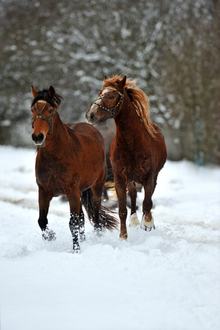Researchers at the University of Liverpool in the England addressed the question of whether the time of year/season has an effect on the number of horse colic cases. During the study, a clear fall/winter peak was found for impactions, spring for equine grass sickness, and with peaks in both the spring and fall for all other types of horse colic.

Seasonal changes and horse colic
More time spent in a stall, reduction in level of exercise and/or turn out and change of roughage in diet are factors in colic.
Information from large breeding farms suggests that the routine of feeding horses grain after being brought in from pasture and then keeping them in stalls for part of the day increases the risk of colic, and specifically colon tympany and displacement of the large colon.
By altering this daily routine, including keeping horses turned out after grain feeding, colic incidence is decreased. Similarly when hay is available to horses in pasture, the hay is consumed as part of the diet, and incidence of colic is decreased in horses turned out.
Sudden changes in a horse’s activity level, diet and stabling which are common during colder months increase the risk for colic. Research suggests that changes in intestinal motility may account for that decrease.
Keeping your horse healthy also means monitoring its weight in order to avoid common health issues such as equine metabolic syndrome, laminitis and Cushing’s Syndrome.
The English study found that intestinal motility was significantly lower in stabled horses than in those kept on pasture. Slower motility means that food is retained longer; therefore, the intestinal contents become drier. This was especially true in the pelvic flexure, where the horse’s colon narrows and turns back on itself.
This portion of the intestinal tract is the most common site of colon impaction due to dry intestinal contents, which are a major cause of colic during the winter months when horses are not drinking enough water.
While the study did not determine why there was decreased intestinal motility in stalled horses and a greater probability for impaction colic, it appears that water intake, either through drinking or grazing, as well as regular low-level exercise seems to support normal intestinal motility and a decreased incidence of colic.
